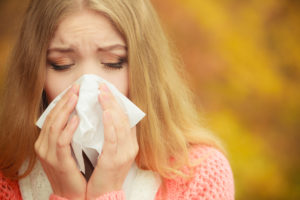September 28, 2016 | Black & Kletz Allergy

What is Ragweed?
As an allergy specialist Centreville, VA has to offer might attest, ragweed is a tough and hardy soft-stemmed weed that can grow well along roadsides, riverbanks, vacant lots, and fields. It belongs to a genus called Ambrosia and there are 17 different species of ragweed. The height of the plants generally range from about 3 inches to 12 feet.
The plants mature in mid-Summer and produce small flowers. Warmth, decreased humidity, and active breezes after sunrise help create the ideal environment for ragweed flowers to release their pollen. Each individual plant can release up to one billion pollen grains. Though most of the released pollen stays in the general area, some grains can travel as many as 500 miles in dry and windy conditions. This helps explain why pollen counts are usually lowest on rainy days and cool mornings. Individual plants pollinate only for one season but the seeds survive in the soil from year to year producing fresh crops each year. Over the past decade, the EPA has noticed a prolonged ragweed season in the Washington, DC area. Climate changes and increased carbon dioxide levels in the atmosphere may play a role in this prolongation of the ragweed season.
How Does it Cause Allergies?
Though ragweed pollen is generally harmless, in a genetically susceptible individual, the immune system can mistake it as potentially dangerous invader and mount a defensive attack. This process triggers antigen (ragweed) vs. antibody (immunoglobulin) reactions on exposure, resulting in the release of chemical mediators like histamine which are responsible for the classic annoying hay fever and/or asthma symptoms. An estimated 15% of all Americans are sensitive to ragweed. As an allergy specialist in Centreville VA may explain, the risk of developing sensitivity is higher in people with other types of allergic disorders like eczema (i.e., atopic dermatitis) and asthma and in those with a family history of similar disorders.
What are the Symptoms?
- Itchy nose, eyes, throat, and ears
- Watery and/or red eyes
- Runny nose, nasal congestion, and/or post-nasal drip
- Sneezing
- Post nasal drip and/or throat irritation
- Cough, chest tightness, wheezing, and/or shortness of breath
- Sinus pressure and/or headaches
- Fatigue
- Snoring
- Clogging and/or popping of the ears
Though “hay fever” is the term commonly in vogue, “seasonal allergic rhinitis” is a more accurate description of the condition.
Oral allergy syndrome (i.e., Pollen-food allergy syndrome) is a condition where one experiences itching of the lips, mouth, and/or throat after eating fresh fruits and/or vegetables. The cause of the phenomenon is a cross-reactivity between similar proteins in the pollen and the fruits and/or vegetables. Ragweed pollen typically cross-reacts with melons, bananas, cucumbers, avocados, kiwi, and zucchini.
How is it Diagnosed?
An allergy specialist Centreville, VA residents turn to for help will take a thorough history and physical examination. A simple allergy skin test can be performed by applying the diluted allergen (ragweed) to the surface of the skin. A raised, itchy, red bump after 15 to 20 minutes at the site of application confirms sensitivity to the allergen. Alternatively, a blood test can also be done.
What Can Be Done to Minimize the Symptoms?
- Keeping track of pollen counts and avoiding outdoor activities to the possible extent on high pollen days.
- Keeping the windows closed in homes and automobiles and running air-conditioning.
- Changing clothes and showering before going to bed.
If the symptoms are bothersome in spite of environmental control, several medications like antihistamines, nasal sprays, eye drops, and inhalers may be needed. Keep in mind that most medications only mask the symptoms without treating the underlying cause and can cause undesirable side effects. Many individuals also become tolerant to an antihistamine and what had helped initially becomes ineffective.
Allergen immunotherapy (i.e., allergy shots, allergy injections, allergy desensitization) is a process of increasing tolerance to the allergens by exposing the immune system to gradually increasing the concentrations of the antigen at regular intervals. This process has the potential to offer long-term benefit to many people who experience bothersome symptoms every year. Allergy shots are effective in 80-85% of individuals and have been used in the U.S. for over 100 years.
A Centreville, VA allergy specialist at Black & Kletz Allergy can treat both adults and children with ragweed allergies in the Washington, DC, Northern Virginia, and Maryland metropolitan area. We have convenient offices in Washington, DC, McLean, VA (Tysons Corner, VA), and Manassas, VA that all offer on-site parking. The Washington, DC and McLean, VA offices are Metro accessible and there is a free shuttle between the McLean, VA office and the Springhill metro station on the silver line. Please call us for an appointment or alternatively you can click Request an Appointment and we will respond within 24 hours by the next business day. We can also answer your questions and concerns about other allergic and immunologic disorders, since we have been providing allergy, asthma, and immunology care to the local community for over 50 years. If you’re looking for an allergy specialist Centreville, VA patients recommend, turn to a board certified allergist at Black & Kletz Allergy.












